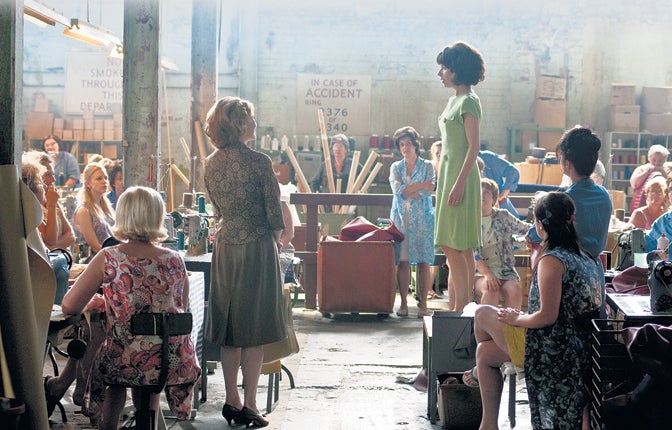Joan Smith: What if women just paid less tax?

Do you sometimes feel you've been reading about the gender pay gap all your adult life? Do the statistics blur before your eyes as you gaze at age and salary tables? It happens to me too, and I have a personal interest in the subject. So when I read yesterday that female executives might have to wait 98 years to get equal pay, my immediate thought was: is that all?
We don't have equal pay now any more than we did in 1970 when the Equal Pay Act promised to usher in a new era for women in the workplace.
Yesterday's report from the Chartered Management Institute suggested 2109 as the year when female executives can expect to catch up with their male counterparts at current rates of progress, given that the men currently earn an average of £42,441 compared with £31,895 for women doing the same jobs.
If an Act of Parliament hasn't achieved its stated objective after 41 years, despite a bit of tweaking, it's hard to see the situation getting better even by early next century unless someone is prepared to take drastic action. (Bear with me. I have proposals. And they are drastic.)
The overall pay gap between men and women in this country is around 21 per cent, which means the new research confirms a previously noticed trend; the pay gap tends to be wider for women with higher educational qualifications. In the 1960s, the fight for equal pay was led by working-class women, notably the Ford machinists whose struggle was celebrated in one of those nostalgic movies the UK film industry is so keen on; Made in Dagenham treated discrimination against women workers as a historical phenomenon, but the attitudes behind it have gone underground, not disappeared altogether.
This isn't what we're supposed to believe. Excuses for the continuing gap are legion, including the tendency of men and women to bunch in different occupations, the fact that women take career breaks to raise families and the influence of lunar cycles. (OK, I made the last bit up.)
So it's fascinating to hear that a gender pay gap exists in most developed countries, including socially liberal Scandinavia and the fiscally conservative US. The American research, carried out by the Census Bureau in 2007, is especially interesting because the country has had its own Equal Pay Act since 1963 but inequality persists right across the economy.
Female workers earned less than men in 20 industries and 25 occupation groups, and that was true even in sectors dominated by women; female secretaries earned 83.4 per cent of the salary paid to their male counterparts. In traditionally male occupations such as lorry driving, women fared even worse, earning only 76.5 per cent of the weekly wage enjoyed by men.
Why should this be? Only a misogynist would suggest that men are universally better than women across the entire field of paid employment, so there has to be another reason why this form of discrimination is so widespread. The obvious one, that employers view men and women differently, was tested in 2008 by the American academics, sociologist Kristen Schilt and economist Matthew Wiswall, who carried out a unique piece of research on people who had changed sex.
They cited the case of an economics professor, Donald McCloskey, who announced to his colleagues that he was having an operation to become Deirdre. McCloskey was jokingly told by his head of department that it would mean a pay cut, but Schilt and Wiswall discovered that's the actual experience of many male-to-female transgender people.
Men who had surgery to become women earned 32 per cent less on average after the change, even after taking into account variables such as educational qualifications; women who became men earned 1.5 per cent more.
The academics observed that becoming female often brings with it a loss of authority, harassment and a loss of employment, while becoming male tends to produce an increase in respect and authority. These startling findings challenge traditional explanations for the pay gap, illustrating the "often hidden and subtle processes that produce gender inequality in workplace outcomes".
They also confirm what I've long suspected, which is that there's an unacknowledged "woman tax" on female employees. Unconscious attitudes towards men and women are often quite different, shaped by years of prejudice about men as "breadwinners" and the assumption that women are less likely to make a fuss. They wouldn't have to if any government had the courage to take the one step that would transform the situation overnight: force companies in the public and private sector to be completely transparent about how much they pay all their employees.
It's a suggestion guaranteed to produce howls of protest on all sides, so I think I can safely say it would work. If politicians are too pusillanimous to do that, my other proposal is just as radical: let's have a "woman discount" on fixed costs such as council tax, utility bills, national insurance and so on.
Twenty per cent is a nice round figure, and a neat reminder of how much British women are underpaid. Frankly, I don't feel like waiting until 2109.
Subscribe to Independent Premium to bookmark this article
Want to bookmark your favourite articles and stories to read or reference later? Start your Independent Premium subscription today.

Join our commenting forum
Join thought-provoking conversations, follow other Independent readers and see their replies